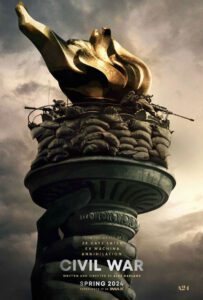
Director: Alex Garland
Release Year: 2024
Runtime: 1h 49m
We all know how fraught politics are these days. I’m surprised, honestly, that one of our better sci-fi guys, Alex Garland, decided to wade into those waters. Though he only kind of does in this movie that is ostensibly about authoritarianism and polarization. Because there really are no politics in this film. No left. No right. Just a third-term president trying to control the uncontrollable spirit of nihilism that seems to guide everything everyone does. After all, who would ever suggest that California and Texas would join forces to create the rebel secessionist forces? It’s absurd to the point of actually ignoring the politics of the moment. Or doing some sort of irony thing that I’m too stupid to understand. Of course we have no clue how far into the future this civil war is happening, nor who is actually on the federal government’s side, but there seems to be a purposeful masking of motivations and details who is fighting for whom and why. Though there doesn’t seem to be any kind of overriding reason or ideology to divide the country like slavery or… whatever these assholes believe in.
Because we’re dropped into this war towards its end, the whole thing is a little disorienting. You want to find out or figure out all the stuff above — like why the hell this thing broke out to begin with — but Garland gives you next to nothing. There’s a little vignette at the beginning that intros the president (Nick Offerman), but it was honestly a little hard to follow given the complete lack of context to the goings on. Then we latch on to a veteran photo journalist, Lee Smth (Kirsten Dunst), and Reuters journalist, Joel (Wagner Moura). Lee Smith has the same name as a relief pitcher from the 80s who I’m weirdly familiar with. And apparently Joel has no last name. Plus — and, again, maybe I’m not smart enough to figure out why, considering a scene later in the movie — Joel is clearly not American. We don’t know where the character is supposed to be from originally (he says later he’s from Florida), but Moura is Brazilian and is clearly not a native English-speaking person. Which kind of flies in the face of a discussion with Jesse Plemons’ weirdo, racist militia member later on in the film. Unless the point is that because Moura appears white and despite his thick foreign accent, he “passes” as American? I don’t know, it seems like an odd casting choice given the situation.
The two journalists plan to go to D.C. to interview the president. A trek that they have to know will be filled with danger and pitfalls. There’s a war on, after all. Yet they decide to take along a young aspiring photo journalist, Jessie (Cailee Spaeny), and an old-ass, decrepit journalist — and Lee’s mentor — Sammy (Stephen McKinley Henderson). Again, the choice here by otherwise experienced, smart characters is really dumb. An impetuous stranger and a semi-disabled senior citizen don’t seem like great travel partners when trying to carefully keep a low profile and needing the ability to make quick get-aways when things get hairy. In fact, it’s the worst decision. No matter how things turn out. As expected, they meet with a lot of violence, assassinations, random killings, marauders and all sorts of nonsense on their roadtrip from NYC to the front in Charlottesville, Virginia and, eventually, Washington D.C. Though, despite being in a country going through a civil war — and also being journalists — they constantly seem surprised by things. By peoples’ attitudes. By peoples’ allegiances. And, yes, most of the shock is seen through the eyes of young Jessie, but even the grizzled veterans are amazed that it’s sometimes hard to tell which side is which and who the good and bad guys are. Or if there are good and bad guys at all. Why the shock? Why are they just finding this stuff out? Do they not watch the news? Do they not report the news? Only Alex Garland can tell us, and he ain’t talking. Or, apparently, paying attention to the obvious cognitive disonance.
I’m honestly not sure what the message was here. Or the point of view. Other than the fact ambition can inure us to violence. And violence can inure us to more violence. But maybe this is the whole point of Garland’s experiment. He presents us with an ambiguous situation, doesn’t really zoom in on our characters or make us care one way or another about them and hopes that we can form our own opinions. Granted, I’m not certain any of us is supposed to be rooting for the fascistic government, but, hey, we are in the year 2024, when at least half the country seems like they might be inclined to do so.


